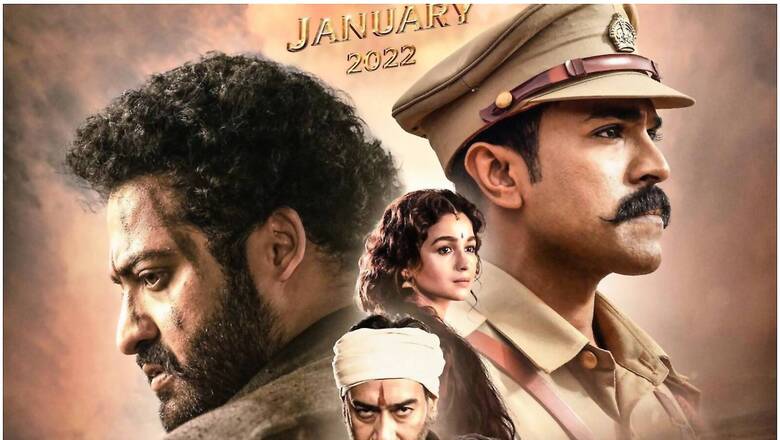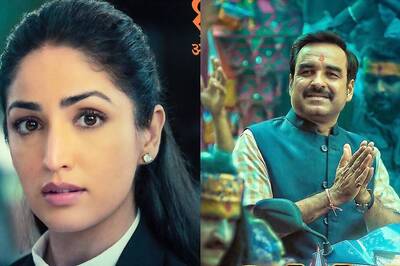
views
Ajay Devgn is a big Hindi movie star but his biggest hit has come from a small part in a Telugu movie, S.S. Rajamouli’s RRR. Kiccha Sudeep is a big Kannada star but his biggest solo hit has come from a Telugu film again, Rajamouli’s Eega (2012).
Moral of the story? That every movie star needs to act in a Rajamouli movie to become pan-Indian? Or, is it that Telugu is our national cinematic language? Or, is it that India is a country with many languages, each distinct and beloved?
It is the latter for sure, no matter the Twitter exchange between Devgn and Sudeep on Hindi being our national language. Sudeep expressed his opposition to that idea while celebrating the success of KGF: Chapter 2. Devgn disagreed with him, calling Hindi our mother tongue and national language, not only invoking the idea of nation as Bharat Mata, but also Hindi as its uniform language.
ALSO READ | Baahubali, Pushpa, RRR: The South Rises as Bollywood Appears Fake, Out of Touch
Leave aside the stupendous success being enjoyed by non-Hindi films at the Hindi box office in the last few years. Leave aside the queue of stars from the Hindi film industry, streaming services from the US, and producers entrenched in Bollywood at the doors of directors and actors from what was pejoratively called “down south”. Down south was where once actresses who failed in Bollywood went to make a career. Down south was where greats such as Rajinikanth and Kamal Haasan ruled but then failed when they came to Mumbai. And down south was where technicians from Bollywood refused to work unless paid extra.
How things have changed, as they should. The linguistic reorganisation of India is proof of the relevance of what we call regional languages. The States Reorganisation Act was passed in 1956 but the process of redrawing the country on linguistic lines had already started in 1953 with Andhra Pradesh created for Telugu-speaking people after the death by hunger of Potti Sriramulu. Thereafter there have been many additions along linguistic lines including in 1960 when Bombay was divided into Gujarat and Maharashtra after prolonged violence.
People are willing to die for their language. The history of India shows us that repeatedly. So those political parties that speak of a uniform language are doing a disservice to our shared past. It is not as if our founding fathers and mothers did not discuss this in detail. Jawaharlal Nehru was one of the earliest to sound the alarm on linguistic chauvinism. His advisor V.K. Krishna Menon articulated it more precisely when he suggested that carving out Kerala could make it go Communist and creating a Tamil-speaking state would give rise to sub-nationalism of “fascist orientation” but Nehru knew the idea of states as merely administrative divisions would be against the forces of history.
Even when agreeing to Hindi, or rather Hindustani, as the language best able to represent the “composite culture of India”, Nehru said in the Constituent Assembly debates of 1949 that it should not be forced upon anyone. The greater concern at that time was that English, a colonial language, would be forced upon the country and be inimical to its growth. When Govind Ballabh Pant, whom Nehru appointed as a chairman of the Parliamentary Committee on Official Language in 1957, recommended in 1959 that Hindi be made the primary official language with English as the subsidiary language, Nehru had to give an assurance on the latter remaining an associate, additional official language to calm the fears of non-Hindi-speaking states.
He could not have imagined that English would be the official language even in Bollywood, as actor Nawazuddin Siddiqui said recently. He said the Hindi film industry is perhaps the only one in the world where everyone speaks English off-screen. The scripts are written in Roman and most interviews that actors and directors give about their movies are usually also in English, which is unlike other film industries in India and across the world. Bollywood is the last place where one would expect to find Hindi chauvinists.
So it’s no surprise to find Bollywood queuing up to be a part of Telugu and Kannada films, after the stupendous success of Baahubali 1 and Baahubali 2, RRR and KGF: Chapter 1 and KGF: Chapter 2. It is adept at reading successful scripts, whether in Hindi or Telugu. And it understands one language above everything else — the language of the box office, which is pan-Indian, inclusive of all languages and diversities.
The author is a senior journalist and former editor of India Today magazine. The views expressed in this article are those of the author and do not represent the stand of this publication.
Read all the Latest Opinions here




















Comments
0 comment